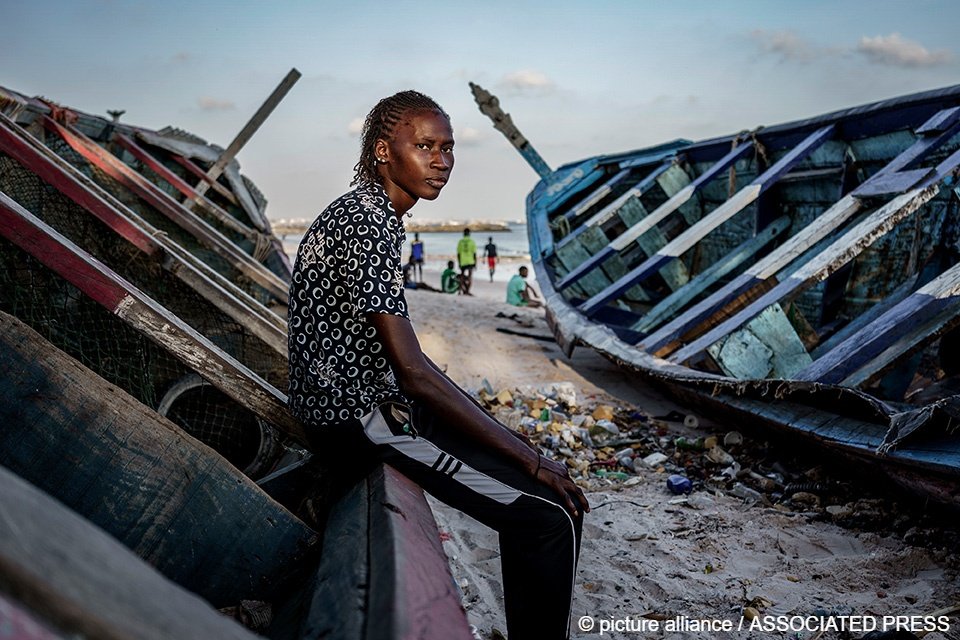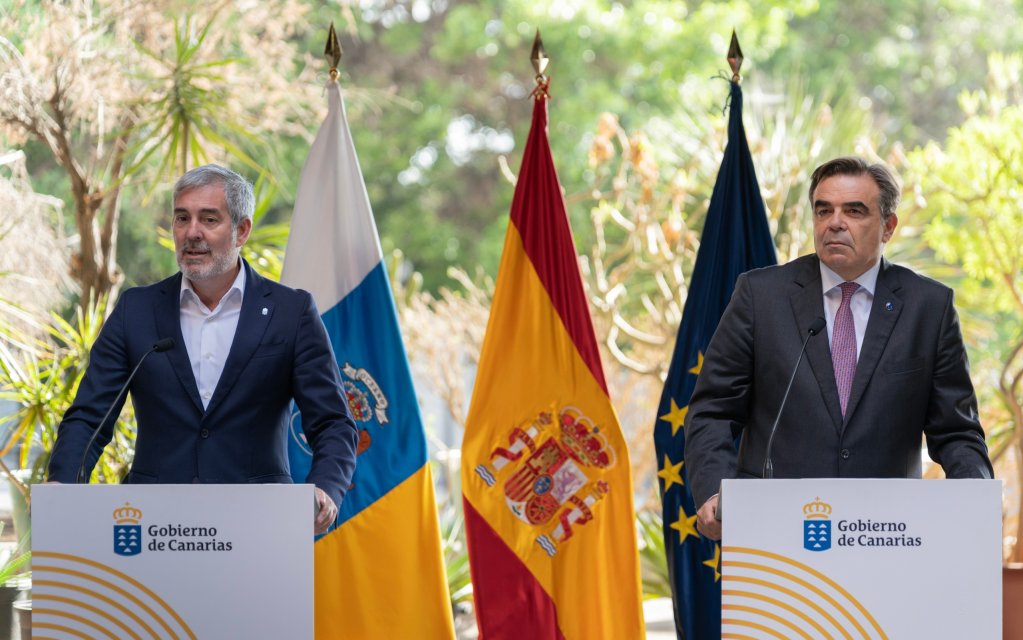More than 1,500 migrants have arrived on various Spanish island territories in the Atlantic and the Mediterranean over the past few days. More than 1,400 of these arrived on various Canary Islands and more than 111 arrived on the Balearic Islands in the Mediterranean. At least one person was found dead.
On Thursday (February 13), the Spanish rescue service Salvamento Maritimo confirmed that in the "last few hours" 217 people, including nine women and a child arrived on the Spanish Canary Islands archipelago in the Atlantic Ocean.
Around 152 people disembarked in La Restinga on El Hierro at around 2 am, reported the Portuguese press agency LUSA. Around 65 people, including four women, arrived on Lanzarote, also during the night.
Late on Wednesday (February 12), the Spanish rescue authorities confirmed more than 1,300 migrants arrived in the first half of this week on different Spanish islands between the Canary Island archipelago in the Atlantic Ocean and the Balearic Islands, Mallorca and Formentera in the Mediterranean.
Read AlsoBodies of four Pakistanis repatriated after migrant boat disaster off West Africa
More than 1,200 arrive on Monday
On Monday (February 10), the authorities carried out 20 rescue operations, bringing in 1,232 migrants to the Canary Islands, the Spanish archipelago in the Atlantic Ocean.
During one of these operations, a boat sank off the island of El Hierro, resulting in one death and at least one person missing, reported the Spanish news agency EFE. This boat, said the authorities, was spotted on a routine radar scan of the area. When the rescue teams arrived at the scene, the boat was already semi-capsized and the occupants were in the water.
Of the 78 people who survived, there were 10 women and one baby, stated EFE. Some of the survivors on board reported that at least two people were missing. However, the Spanish authorities have not been able to confirm that or find the missing.
At least seven different boats were rescued off El Hierro, reported EFE, and a total of 442 people arrived there during the course of Monday and Tuesday.
On Wednesday, 111 people were rescued on two different Balearic islands. Ninety-two migrants, originally from sub-Saharan African countries were intercepted south of Mallorca and 19 from North African countries were found on the small Mediterranean island of Formentera.
Spanish government figures show that 5,361 migrants arrived in Spain during the first month of the year, 4,752 of them on the Canary Islands, marking a reduction of 34.6 percent compared to arrival numbers in the same month in 2024.
Around 64,000 migrants arrived in Spain during the course of 2024, a 12.5 percent increase on the previous year, 2023.
Healthcare funding for migrants
The Spanish Congress on Wednesday voted in favor of an agreement between the central government and the Canary Islands to secure extra funding for healthcare services provided to migrants arriving on the archipelago.
The agreement was supported by all groups in the chamber, including the conservative PP and the socialist PSOE, except for the far-right Vox party, reported El Diario.
The motion calls on the Spanish central government to assume more responsibility for migration matters, and not leave it to the Canary Islands’ authority to shoulder the costs and responsibilities alone.
Read AlsoPakistan to the Canary Islands: Does a migrant shipwreck shed light on a new route?
'Address the elephant in the room'
One of the main advocates for the motion, Cristina Valido from the Canaries Coalition (Coalición Canaria), said during the debate that Spanish lawmakers need to "address the elephant in the room, that everyone sees, but on which no one wants to act." Valido added that she believes this is "a phenomenon that is not going to change, but rather will get worse," reported regional newspaper La Voz from Lanzarote.

The Canary Islands regional government has asked for the costs of health care in 2024, estimated at 26 million euros to be paid to the local health and welfare services. The actual budget the government had at its disposal that year, reported EFE, was just 4.369 million euros.
Distribution of minors
Regional authorities have been in dispute with Spain’s central government for months over whether or not to allow for a redistribution of migrant minors from the Canary Islands, where the majority arrive, to other parts of the country that might be able to provide more support.
The regional president of the Canary Islands, Fernando Clavijo, stated Tuesday that securing funding is the only remaining step to finalize the redistribution of 4,500 migrant minors from the Canary Islands and Ceuta, a framework that is being coordinated with the central government.
Some regions have tried to resist being part of the effort, and Spanish Prime Minister Pedro Sanchez has also said that semi-autonomous regions in the north, like Catalonia and the Basque country, could opt out of the redistribution. The opt-out is disputed by other regions, but Sanchez knows he has to keep these two richer regions on his side, to calm the voices that call for complete independence from Spain.

Clavijo was due to travel to Madrid on Wednesday to meet with Spain’s Minister of Finance Maria Jesus Montero. However, at the last minute, reported Canarias 7, the meeting was postponed until March, because of an illness.
Read Also'We're suffering here': Abdoulaye, housed in a reception center in Madrid
'Exhausted and under pressure'
When that meeting finally takes place, reported the regional news platform, Clavijo hopes that the central government will be able to agree on a financial framework that helps support the Canary Islands’ authorities without the need to modify the current immigration law.
According to Canarias 7, Clavijo sent a message to Spanish media on Wednesday, assuring them that he is "confident that the decree law, or bill on the distribution of unaccompanied migrant minors can be ready at the beginning of March."
One Canarian lawmaker said that El Hierro, one of the smallest islands in the archipelago, had adequate health facilities to support its own population, but not enough to care for all the migrants who arrive.
Raul Acosta from an independent El Hierro party (Agrupación Herrena Independiente – AHI) added that healthcare professionals and rescue personnel were "exhausted and under enormous pressure" because they were "always on call," reported EFE.
"It is as if every day they are witnessing multiple accidents with several injuries," explained Acosta, calling on the central government to become more involved.
With EFE and LUSA
